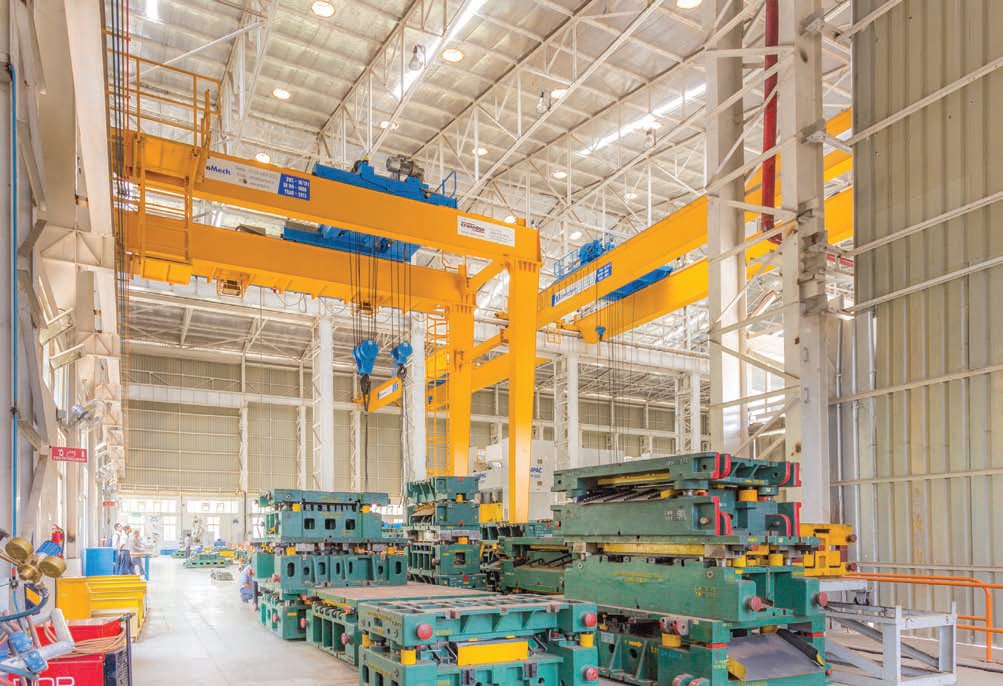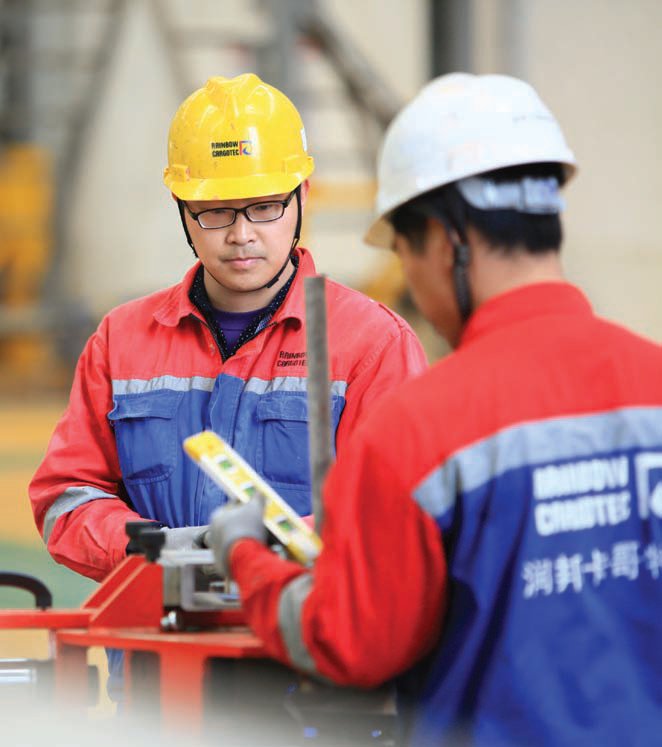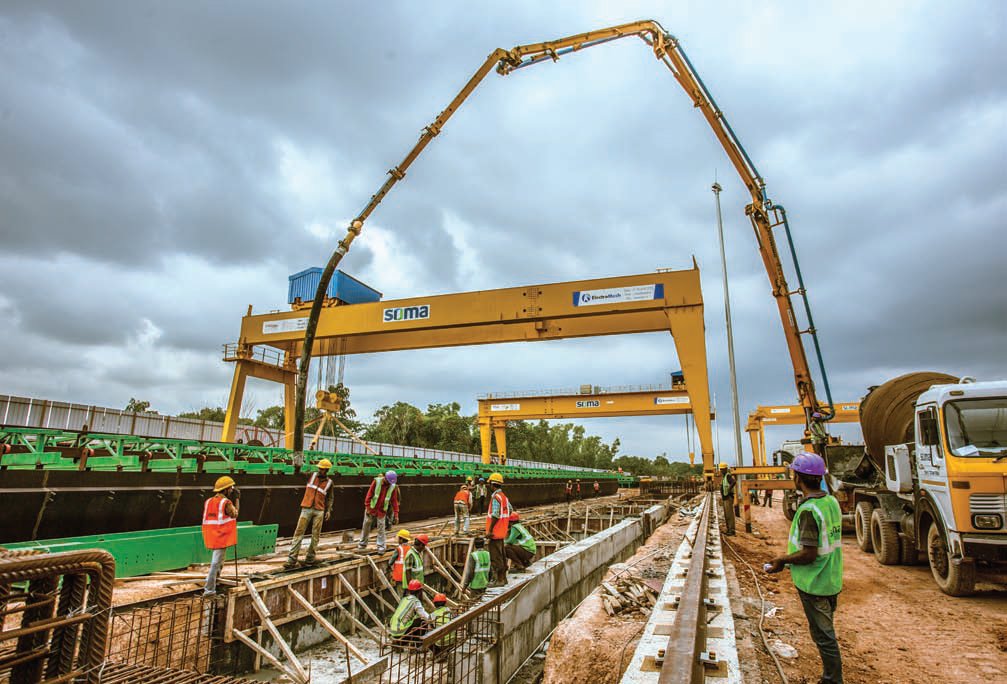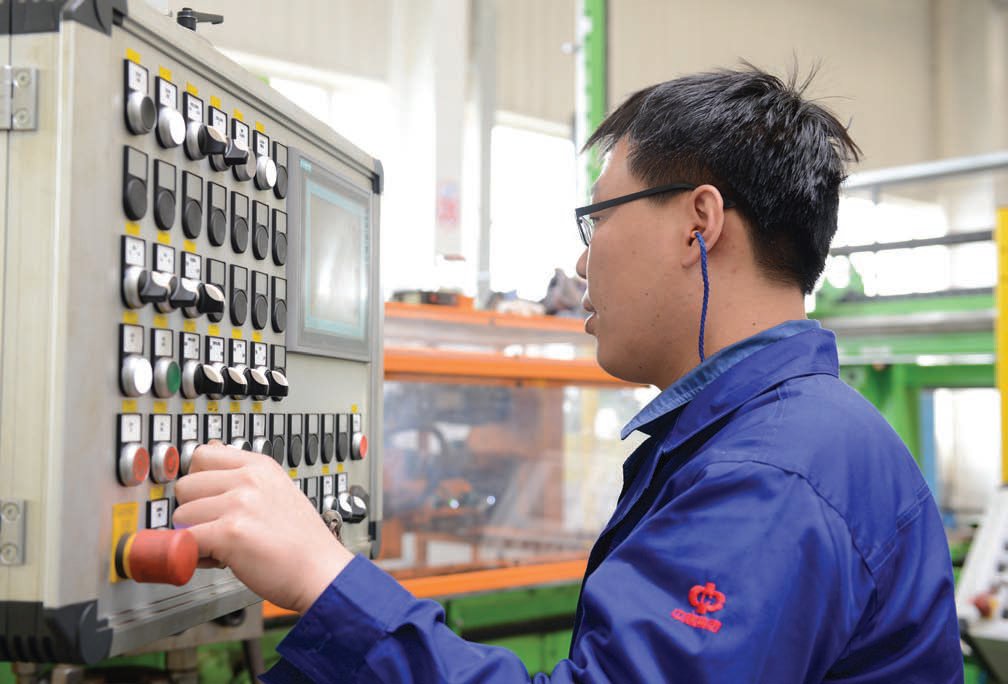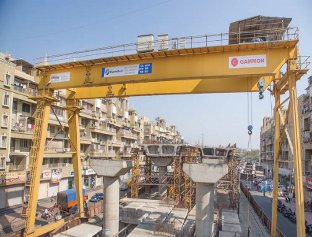The domestic challenge
10 December 2015a stuttering export-led model and an economic slowdown in china is having a major impact on asian overhead lifting manufacturers. indonesia and china are witnessing considerable changes in operating conditions, while india is proving to be a beacon of hope, and growth among all of this.
For Tushar Mehendale, managing director at overhead crane manufacturer ElectroMech, he believes his firm has performed well in the Indian market, claiming that the business has been proactive in tapping newer industry verticals and newer geographies that helped us to achieve growth in a challenging domestic market.
He explains: "We have actively started participating in the opportunities afforded by the oil & gas sector in partnership with Stahl Crane Systems and have successfully executed several multi million dollar projects over the past year, both in India as well as abroad. As for newer geographies, today we have our crane installations in over 37 countries across the world spanning from Mexico to Australia.
"The business is now emerging more as a global player than simply being a crane company catering only to the Indian markets. Not only do we continue to be the biggest overhead cranes manufacturer in India in terms of volumes but we also now have almost a third of our revenue coming in from exports."
Engineering capabilities
For Mehendale and ElectroMech, the company has bolstered its engineering capabilities and is focusing its energies on offering bespoke engineered cranes for clients across different industries, across different geographies, satisfying a whole host of different statutory requirements and confirming to different design standards. This is all the more pertinent at a time when Mehendale identifies the domestic market in India as an industry that has shrunk drastically.
"Newer infrastructure investments haven't happened in the past few years and because of this the entire country is left with an excess of manufacturing capacity. With the new government coming to power last year and with macro economic indicators of the country improving, the excess manufacturing capacities are slowly getting utilised and many of our clients across industries have started showing improving financial condition and the economy as a whole is also recording a decent amount of growth," he stresses.
Mehendale states however that it will take quite some time before the benefits of this situation trickle down to the capital goods industry in general and industrial cranes in particular.
Trickle down effect
He explains: "Hence even though the economy at the macro level is showing growth of 7.5%, the Indian industrial crane market has actually shrunk by at least 30% over the peak it had achieved in 2011.
"However, the country still faces headwinds in view of the slowdown of the Chinese economy. Today, even by a back of the envelope calculation, one can safely say that the manufacturing capacities lying idle in China are much more than the total manufacturing capacity of India put together. One example of a direct sufferer on this account is the steel industry in India.
"The total installed capacity of steel manufacturing in India is barely 10% of the total steel manufacturing capacity of China. Hence a lot of Chinese steel is being dumped in the Indian market at ridiculously low prices, which is bleeding the Indian steel companies. Naturally on account of this all the capacity expansion / modernization projects in the steel sector are under review and this directly affects the overhead crane business in these sectors.
"A lot of crane manufacturers in India are under tremendous financial stress on account of huge amounts of receivables pending from this sector. Even though the government has recently introduced a 20% anti dumping duty on steel being imported from China, the impact of this protective measure can be visible only after a few months down the line.
"So, just as the steel industry is under tremendous pressure, other basic industries are also suffering from similar malaise. Hence only time will tell as to how this situation plays out in the coming couple of years."
Market conditions
In challenging market conditions, Mehendale feels that ElectroMech's key strengths lie in its ability to cater to a multitude of requirements across a diverse range of industries as well as a diverse range of geographies.
He says: "We have built our expertise in not only supplying one off exotic cranes like single failure proof cranes for nuclear power industry but also, at the same time, supplying simple workshop duty cranes for simple general engineering workshops.
"Our engineering and sales team is highly geared up to address any client requirements and we approach the clients with an underlying ethos of being a solutions provider.
"Hence you won't find our people pulling out a catalogue from their bag and pointing to an item on it and telling the customer that this is what I have and this is what I am going to sell to you.
"Instead we follow a consultative approach while selling and understand the exact requirements of our customers. As we have a huge range of products - right from standard off the shelf chain hoists having capacities as low as 80t to complex process cranes having SWLs in excess of 200t - we are in a unique position to offer the customer exactly what the customer wants. Our proprietary computer software tools allow our team to quickly come up with a whole list of "what-if" scenarios and allows the customers to evaluate the most optimum option."
According to Mehendale, the industry itself is evolving based on the customer requirements. If you take the case of the domestic Indian market, a lot of multinational companies have been investing in putting up their manufacturing set-ups over the past few years.
He explains: "As a result of this, the pull from the customer is to design and build cranes that satisfy the safety requirements of these customers. Thus crane manufacturers have to supply cranes that satisfy the stringent safety requirements as might be applicable to these customer's plants in Europe or the US.
"There are very few crane companies in India - a few European companies and ElectroMech - that can satisfy such safety requirements due to the experiences these companies have in satisfying similar requirements in different parts of the world."
Future Facing
Parsons Chain China (PCC) has said it will continue to focus on the development of new products that provide a "cost-effective solution" as the business approaches the 10th anniversary since acquiring UK Parsons.
The business, which is located in Zhangjiakou city, Hebei province of China, 180km east from Beijing, focuses on the provision of on-site training and "expertise knowledge in assembling".
Since moving into the Zhangjiakou Industrial Cluster Zone in 2013, PCC has an annual capacity of 30,000t of various industrial chains, a 68,000m2 construction area and 300 units of advanced processing and testing machines.
The company explains: "PCC keeps innovating all the time, now their product range covers 10 series and 500 varieties, from 6mm to 90mm, grade 60, 80, 100 to 120, mining chain, lifting chain, fishing chain, steel rope, textile sling and lifting tool and accessories. We can meet all requirements for varieties industries. Not only their products rank in the leading position in China, but export to UK, France, Sweden, Australia, Russia, US, Korea, Chili, UAE and other countries.
"Our main growth areas are providing personalized lifting solution to meet any special requirement. Developing varieties of Grade 100, 120 chain and associated facilities are additional growth points."
Strong competition
Speaking to Hoist, PCC says that the supply of small size lifting chains in China exceeds demand in recent years and there is a strong competition in this sector. "But there is still great demanding in big size sling chain and related facilities, especially in big project such as city infrastructures, major bridges, highway, express train, and wind farms."
According to PCC, the Chinese government is paying "more and more attention" to the safety and has issued increasing legislation, laws and regulations. "We focus on the principle of "Safety Is Priority" and abides by any national laws, committees to provide products meeting national or international standard upon requirement, never lowers any specification and quality.
Elsewhere, Kalmar and Rainbow- Cargotec Industries Co (RCI) has celebrated the ground breaking of a new jetty at RCI's facilities in Taicang, China.
RCI is a joint venture established in Taicang, Jiangsu Province, China, in 2012 between Cargotec Corporation and Jiangsu Rainbow Heavy Industries.
This is responsible for the production of Kalmar rubber-tyred gantry cranes (RTGs) and ship-to-shore cranes (STSs) for global markets. Kalmar invested in a new jetty to increase RCI's import and export capacity with "shorter shipping time, higher efficiency, and lower logistics costs".
In addition, the new jetty will enable fully erect STS crane deliveries from RCI, which supports Kalmar's STS business growth in the Asia-Pacific region. The new jetty will be 371m long and 12m deep.
It will have two berths of 50,000t and 5000t capacity, respectively. The construction of Phase 1 is expected to be completed by the end of 2016.
Dr Ken Loh, chairman of RCI explained, ":I believe the construction and operation of the new jetty will turn out to be another excellent example of our strong partnership."
